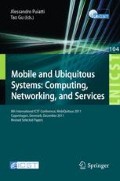Abstract
In this paper, we propose a people-powered location recognition application, Social Geoscape (SGS) that provides highly descriptive geographical information to mobile users. GPS provides the user with latitude and longitude values; however, these values are cumbersome for determining a precise location. A traditional reverse-geocoding database system (i.e., one that converts latitude and longitude values into street addresses) provides locative information based on administrative labeling, but people often do not recognize locations or their surrounding environs from street addresses alone. To address this problem with location recognition, we have created Social Geoscape, a reverse geocoding system that enhances locative data with user-generated information and provides assistance through a mobile interface.
Access this chapter
Tax calculation will be finalised at checkout
Purchases are for personal use only
Preview
Unable to display preview. Download preview PDF.
References
Lynch, K.: The Image of the City. MIT Press (1960)
Lamere, P.: Social Tagging And Music Information Retrieval. Journal of New Music Research 37(2), 101–114 (2008)
Alexander, C.: A city is not a tree (1965)
Davis, M., et al.: From context to content: Leveraging context to infer media metadata. In: Proc. 12th Annual ACM International Conference on Multimedia (2004)
2dkde, http://stat.ethz.ch/R-manual/R-patched/library/MASS/html/kde2d.html
R Documentation, http://rss.acs.unt.edu/Rdoc/library/kernlab/html/ksvm-class.html
WikiPedia, http://en.wikipedia.org/wiki/Downtown_Los_Angeles
Watanabe, et al.: WillCam: a digital camera visualizing users’ interest. In: Proc. CHI 2007 Conference Proceedings and Extended Abstracts, pp. 2747–2752 (2007)
Rattenbury, et al.: Towards automatic extraction of event and place semantics from flickr tags. In: Proceedings of the 30th Annual International ACM SIGIR Conference on Research and Development in Information Retrieval, July 23-27, Amsterdam, The Netherlands (2007)
Kalnikaite, et al.: Now let me see where I was: understanding how lifelogs mediate memory. In: Proceedings of the 28th International Conference on Human Factors in Computing Systems CHI 2010, Atlanta, pp. 2045–2054 (2010)
Kennedy, L., et al.: How flickr helps us make sense of the world: Context and content in community-contributed media collections. In: Proc. 15th International Conference on Multimedia, pp. 631–640 (2007)
Tagmap, Yahoo! Research Berkeley, http://tagmaps.research.yahoo.com/worldexplorer.php
Persson, P., et al.: GeoNotes: social enhancement of physical space. In: CHI 2001: CHI 2001 Extended Abstracts on Human Factors in Computing Systems, pp. 43–44. ACM Press (2001)
Masui, T., Minakuchi, M., Borden IV, G.R., Kashiwagi, K.: Multiple-view approach for smooth information retrieval. In: Proceedings of the ACM Symposium on User Interface Software and Technology (UIST 1995), pp. 199–206. ACM Press (November 1995)
Nakanishi, Y., Motoe, M., Matsukawa, S.: JIKUKAN-POEMER: Geographic Information System Using Camera Phone Equipped with GPS, and Its Exhibition on a Street. In: Brewster, S., Dunlop, M.D. (eds.) Mobile HCI 2004. LNCS, vol. 3160, pp. 486–490. Springer, Heidelberg (2004)
Clawson, et al.: Mobiphos: a collocated-synchronous mobile photo sharing application. In: MobileHCI 2008 (2008)
Hwang, A., et al.: Zurfer: Mobile Multimedia Access in Spatial, Social and Topical Context. In: Proc. Fifteenth ACM International Conference on Multimedia (2007)
Rekimoto, J., Miyaki, T., Ishizawa, T.: LifeTag: WiFi-Based Continuous Location Logging for Life Pattern Analysis. In: Hightower, J., Schiele, B., Strang, T. (eds.) LoCA 2007. LNCS, vol. 4718, pp. 35–49. Springer, Heidelberg (2007)
Sellen, K., et al.: Do life-logging, technologies support memory for the past? An experimental study using SenseCam. In: Conference on Human Factors in Computing Systems, Irvine, CA, pp. 81–90 (2007)
Author information
Authors and Affiliations
Editor information
Editors and Affiliations
Rights and permissions
Copyright information
© 2012 ICST Institute for Computer Science, Social Informatics and Telecommunications Engineering
About this paper
Cite this paper
Sueda, K., Miyaki, T., Rekimoto, J. (2012). Social Geoscape: Visualizing an Image of the City for Mobile UI Using User Generated Geo-Tagged Objects. In: Puiatti, A., Gu, T. (eds) Mobile and Ubiquitous Systems: Computing, Networking, and Services. MobiQuitous 2011. Lecture Notes of the Institute for Computer Sciences, Social Informatics and Telecommunications Engineering, vol 104. Springer, Berlin, Heidelberg. https://doi.org/10.1007/978-3-642-30973-1_1
Download citation
DOI: https://doi.org/10.1007/978-3-642-30973-1_1
Publisher Name: Springer, Berlin, Heidelberg
Print ISBN: 978-3-642-30972-4
Online ISBN: 978-3-642-30973-1
eBook Packages: Computer ScienceComputer Science (R0)

